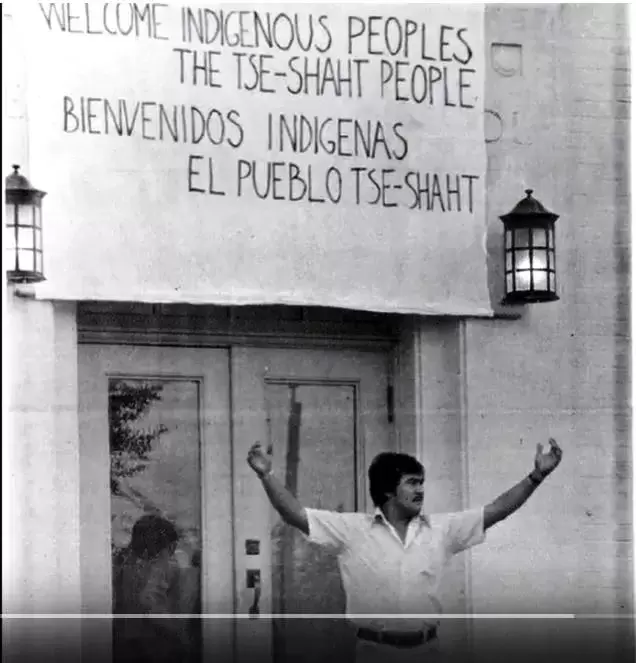A new documentary film featuring Nuu-chah-nulth and Bolivian Indigenous peoples is premiering at ADSS on Sunday, Oct. 21.
The film, titled ‘Let’s Walk Together as One’, was produced by Dan Webb and is dedicated in memory of the late Dr. Simon Lucas.
Webb, who holds a PhD in Political Science, said his documentary tracks the events that emerged out of the 1975 World Council of Indigenous People (WCIP), which was held on Tseshaht First Nation territory in Port Alberni.
Founded in 1974 by the late George Manuel, WCIP was the first global effort established by Indigenous peoples to preserve and protect the group integrity of Aboriginal peoples worldwide.
It came about in part from the actions of Canadian Aboriginal leaders, in particular George Manuel, and from the work of such organizations as the National Indian Brotherhood of Canada. Manuel argued that Indians and other native peoples constituted a "Fourth World," internal colonies in a variety of modern nations around the world.
Richard Watts, Tseshaht, was there in 1975, when world leaders gathered at the property where the Alberni Indian Residential School still stood. He recalled seeing leaders from around the world talking about coping with life in an oppressive society. The WCIP conference drew together Indigenous leaders fighting on behalf of their people for equality.
“I think it (WCIP) legitimized what we’ve been talking about – the racist attitude,” said Watts. Indigenous people want a level playing field and to be a part of regular society, he added.
“When industry and corporations come in, we (Indigenous people) get pushed aside. We may get a few low-level jobs but the biggest gains are made by the owners at the expense of the environment,” said Watts.
When asked if things have changed since 1975, Watts answered that it was hard to say.
“When you weigh the losses against the gains – we’d need an economist to come in and measure,” he said. Ninety-five per cent of the fishing fleet is gone, the forests have been logged, and the earth has been mined, said Watts.
Watts acknowledged some gains in tourism businesses for Nuu-chah-nulth-aht, but, he says, it is a work in progress.
The WCIP, which dissolved in 1996 due to internal disputes, was devoted to developing unity among Indigenous peoples throughout the world, strengthening their organizations, and battling the racism, injustice, and dangers they continue to face. WCIP represented over 60,000,000 Indigenous people worldwide.
The first international conference for WCIP was held in Port Alberni in October, 1975. The meeting, according to Webb, brought together representatives of Indigenous groups from 19 separate countries.
“Through the course of the event, strong international friendships were formed, and this film follows the outcomes of one such relationship between the Bolivian delegates and a group of local political activists,” said Webb.
In a twist, their unlikely bonds of solidarity ultimately contribute to a radical shift in Bolivian politics.
For Nuu-chah-nulth-aht, said Webb, it was because of the Nuu-chah-nulth activism in the 1970s; things like refusing Department of Indian Affairs funding, shutting down the residential school, occupying DIA offices drew the first WCIP Conference to Tseshaht Territory.
“It led to international relationships of solidarity that really helped Indigenous peoples in Bolivia in their fight against colonialism and military dictatorship,” said Webb. “The theme of the documentary is the way in which small, local actions can have much larger, long-lasting consequences.”
This film will appeal to anyone interested in social justice, Indigenous politics, the history of Latin America, or local Vancouver Island history.
Dan Webb, is a former resident of Port Alberni who recently moved to Courtenay, B.C. He holds a PhD in Political Science and for most of his adult life taught at various universities across Canada. He is a published author and aspires to be a professional film-maker.
"Let's Walk Together as One" is his first film, made on a non-existent budget.
The film features commentary from Richard Watts, Ron Hamilton and the late Simon Lucas.
It contains imagery from 1975 including images shared by Tseshaht and Ha-Shilth-Sa.
The film will air Sunday, Oct. 21 at Alberni District Secondary School auditorium at 6:30 p.m.







